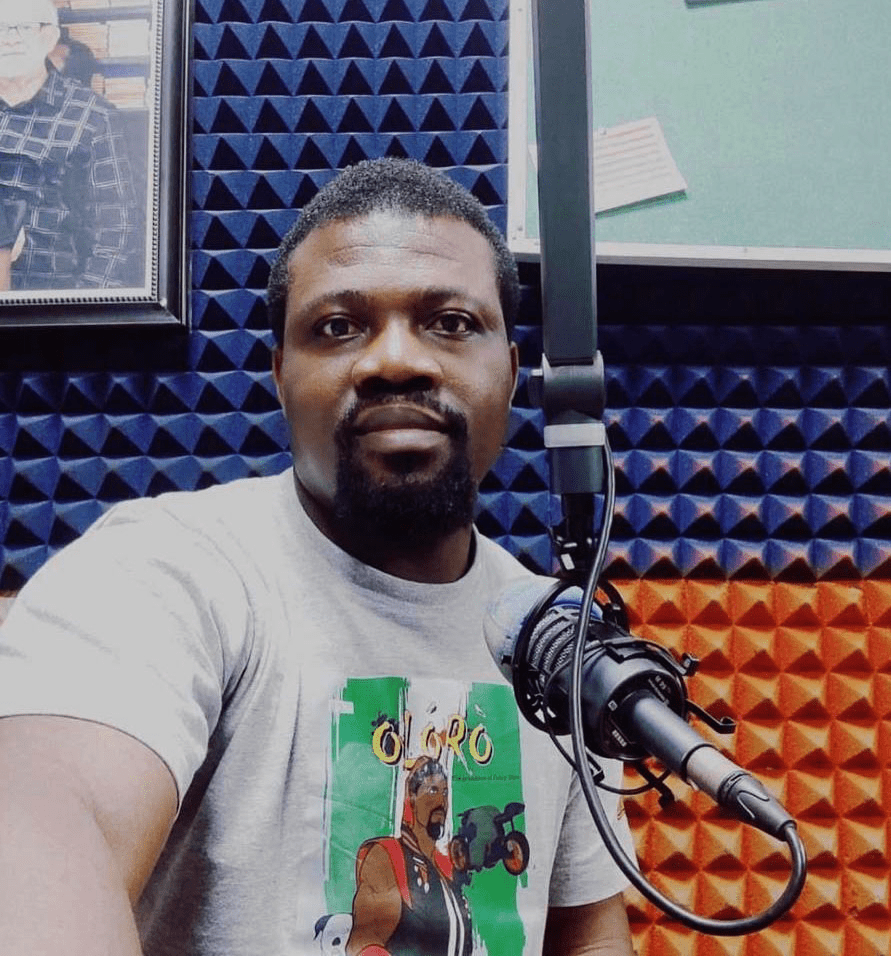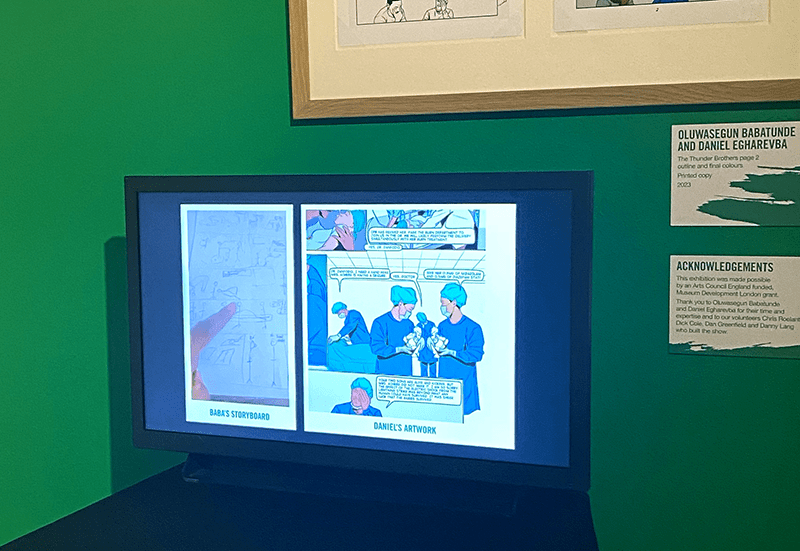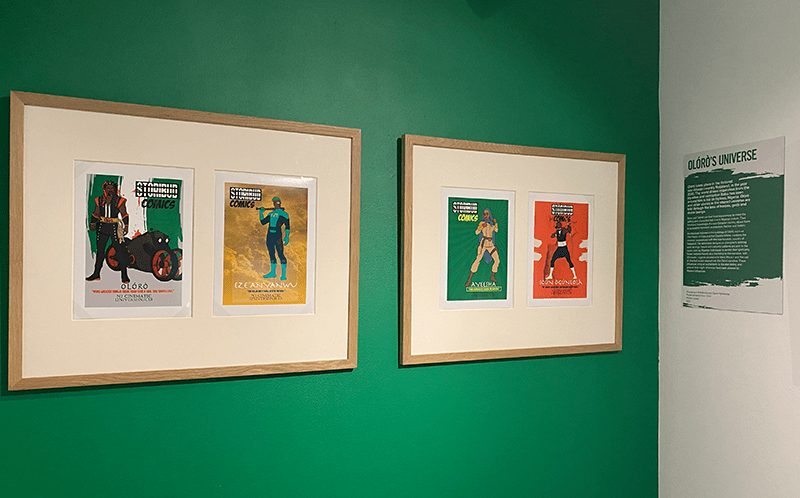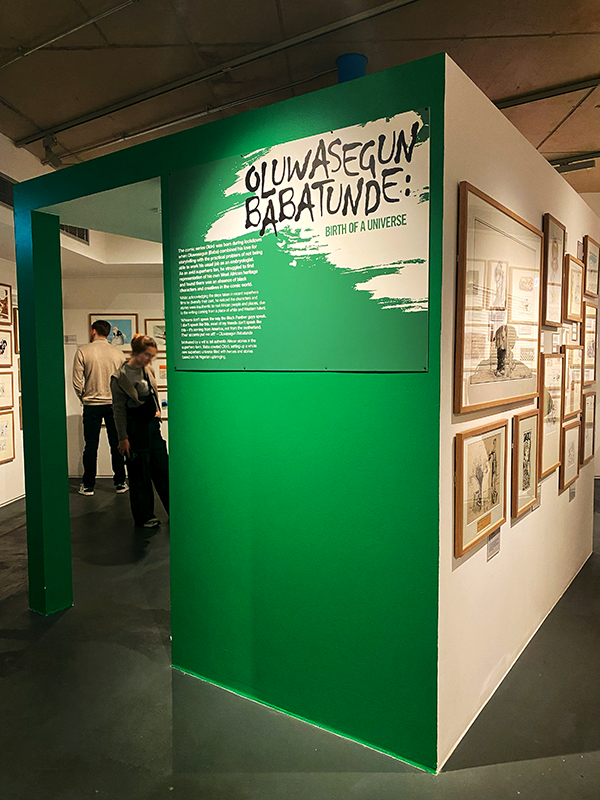The Cartoon Museum is currently showcasing a special exhibition titled “Oluwasegun Babatunde: Birth of a Universe.”
Babatunde’s creation stands apart from the typical Black narrative depicted by White creators in a Western context. Instead, he presents a Black narrative from the perspective of a Black creator – a tale featuring a Black superhero. His narrative isn’t about seeking validation within the Western framework or condemning racism. In Babatunde’s view, the focus is on the myriad struggles people face: socioeconomic disparities, oppression, poverty, and also rich cultural heritage and beautiful traditions. Babatunde’s world is a powerful narrative in its own right. We had a chat with him about how he came up with this new superhero universe and what he’s got in mind for the future.

Oluwasegun Babatunde
Oluwasegun Babatunde is a multifaceted creative force. He is an accomplished author, comic book conceptor, and filmmaker. His artistic vision is rooted in the exploration, progression, and presentation of narratives that illuminate the experiences of black people. This vision extends across various mediums, including published literature, comic books, movies, and animations. Babatunde’s literary repertoire includes thought-provoking titles such as ‘Unethical Or Not’, ‘A Good Human Being’,’ My Book Of Afrobeats Stories’, and ‘Lessons from Hollywood’s Rise’, alongside his recent work on Storibud Comics; ‘Olórò, the Grandson of Fádèyí Olóró’ and ‘AfroGods’.
How did you become interested in creating comics?
Spider-Man was the first comic character that swept me off my feet. Everything about Spider-Man is fascinating, especially the underdog persona. Peter Parker, having so much power, yet choosing to be responsible, helps the real world see the value in not abusing power. So, I could say Spider-Man inspired my comic creative side.
You moved into the creative world after a long career as a clinical embryologist. What sparked that change, and how do you think your previous career and experience have shaped your creativity?
I started out as a clinical embryologist in 2007 and worked in the field until August 2022 when I hung up my scrubs. I had worked in IVF clinics in Nigeria, Belgium, and the United Kingdom. After fifteen years of serving as a medium, a support in ushering couples in their drive to get pregnant, I think my love for art outgrew my love for the sciences and decided to fully delve into a new career in art. It took two years to fully switch.
My scientific background influences my storytelling. Sometimes, my experience plays into my ideas. Having worked as a scientist, I play with the ideas of what scientific breakthrough I could conceive that is able to alleviate the world’s pain. Other times, I play with a terrible/good experience I have had as a Nigerian, Belgian, and UK resident. This, you would observe in Olórò. Also, things I have witnessed happening to other people are flipped into a story. I edit some things to suit a narrative.
You created “Olórò, the Grandson of Fádèyí Olóró” during the Covid pandemic of 2021. How did you go from the idea of a superhero story set in sub-Saharan Africa, to bringing it to life as a comic?
I have been a fan of superhero comics for about two decades, but the thought to conceive my own never took shape in my head. It would have been preposterous to even consider it! I am merely a fan of the superhero genre. Then, the continuous butchering of the African accent on Black Panther wouldn’t let me be.
All my friends from Africa do not speak like they speak in Wakanda; neither do I. Also, the stories were not directly linked to our realities. There are no African countries as advanced as Wakanda! So there and then, the energy to rewrite our stories in the superhero world became a dream and aspiration.
The moment of discovery for Olórò was a day when I was listening to a song by Olamide, an Afrobeats musician. The song was ‘Inferiority Complex,’ and he mentioned Olórò ‘ (‘Olórò’ is a Yoruba word meaning ‘someone to be feared’) while I was pondering on what the title of my first comic book should be. The name clicked.
The exhibition features a video of you working online with your collaborator, Daniel Egharevba, who is based in Nigeria. What was special about collaborating online during the pandemic, across two different continents?
First of all, collaboration could have been with anyone here in the UK, Europe, or even the Americas, but the cultural elements would not have reached the level I aspired to. So, I had to extend my searches beyond the shores of the UK to back home – Nigeria.
It was very difficult finding someone who understood the nitty-gritty of each character idea and where the vision lies. So, I had to test run more than 5 people. I sunk a few hundred pounds into it, until Daniel came along. He instantly became a perfect fit.
What was special about collaborating online with Daniel was trust. I had to trust that he would get the job done – and so he did.

Oluwasegun Babatunde and Daniel Egharevba Rough storyboarding and finished design, Video (2021)From “Oluwasegun Babatunde: Birth of a Universe”
Unlike Marvel’s Black Panther, DC Universe’s Cyborg, and the lead characters in the new Spider-verse films, which were created by White creators, your comics feature Black characters created by you, a Black creator. What do you see as the main distinctions between the Black characters they created, and the ones you’ve developed?
The black characters in both Marvel and DC comics are mind-blasting. Characters such as Miles Morales, Falcon, DeadShot, BloodSport, Cyborg and Black Manta have mirrored the US or Western realities, taking into account racism and American culture. In my own reality, racism does not exist. We are all black! My characters are all layers of black. Zwarte. Noir! What exists in Storibud Comics are classism, oppressions, penury, deep culture, and aesthetically beautiful traditions. They are what my stories portray.
Your character design, the characters’ hairstyles, accessories, and costumes are very eye-catching, blending modern style with elements reminiscent of traditional African attire. The female characters, in particular, showcase a departure from the typical outfits seen in Western superhero series. Can you share the inspiration behind this distinctive style? Were there specific traditional features you kept in mind while incorporating them?
I have an eye for African cultural features, and I ensured they were well-designed with precision. Some of the early movies of my childhood – Nigerian traditional films – were my major source of influence. Characters such as Abìjà Wàrà Bí Ekùn, Òrìsábùnmi, Fádèyí Olóró, Sòún, and many more were my go-to inspiration.

From “Oluwasegun Babatunde: Birth of a Universe”
How do you envision the creation and increased representation of Black characters by Black creators impacting readers, the creators themselves, and the broader landscape of the comics industry?
I think relatability becomes more easily accessible. People from other cultures, other races, can start appreciating individual races’ niches in the world we live in and in the alternate world of comics.
Also, children born in Africa, living in Africa, or born to African families living in the US, UK, and the rest of Europe and the world can more easily see themselves in the imagery of these comic characters. This will be an avenue to keep black culture alive for many generations and potentially inspire new generations to create their own stories influenced by the works of early black comics adopters. The comics industry can only grow and expand further and larger, adding more variety and reducing comic book fatigue.
We’ve heard that you’re currently working on your first movie. Could you give us some insights into your upcoming projects and share your goals for the future?
My debut movie is based on the wave of efforts to better the socio-economic status of a fictional West African country called the United African Republic. While the movie is not centered on my comic books, I left a couple of Easter eggs about my comic book characters in there. So, yeah, you get a glimpse into my next installment after this debut movie – a live-action Olórò movie.
By Haruka Katsuyama
Oluwasegun Babatunde: Birth of a Universe is on until Saturday, 30 March and you can buy Baba’s books through the Museum Shop.
If you love Baba’s work as much as we do, you can find out more here:
Instagram: @oluwasegun.babatunde
Threads: https://www.threads.net/@oluwasegun.babatunde
Facebook: https://www.facebook.com/NaijalandOloro?mibextid=LQQJ4d

